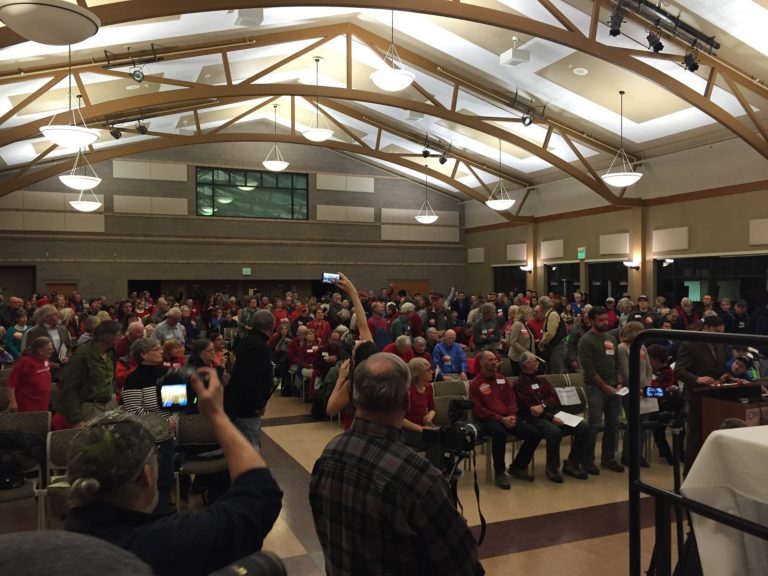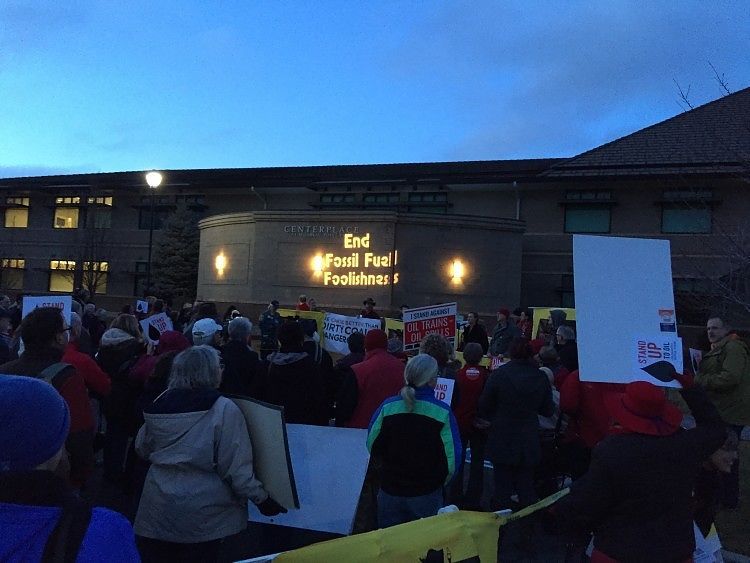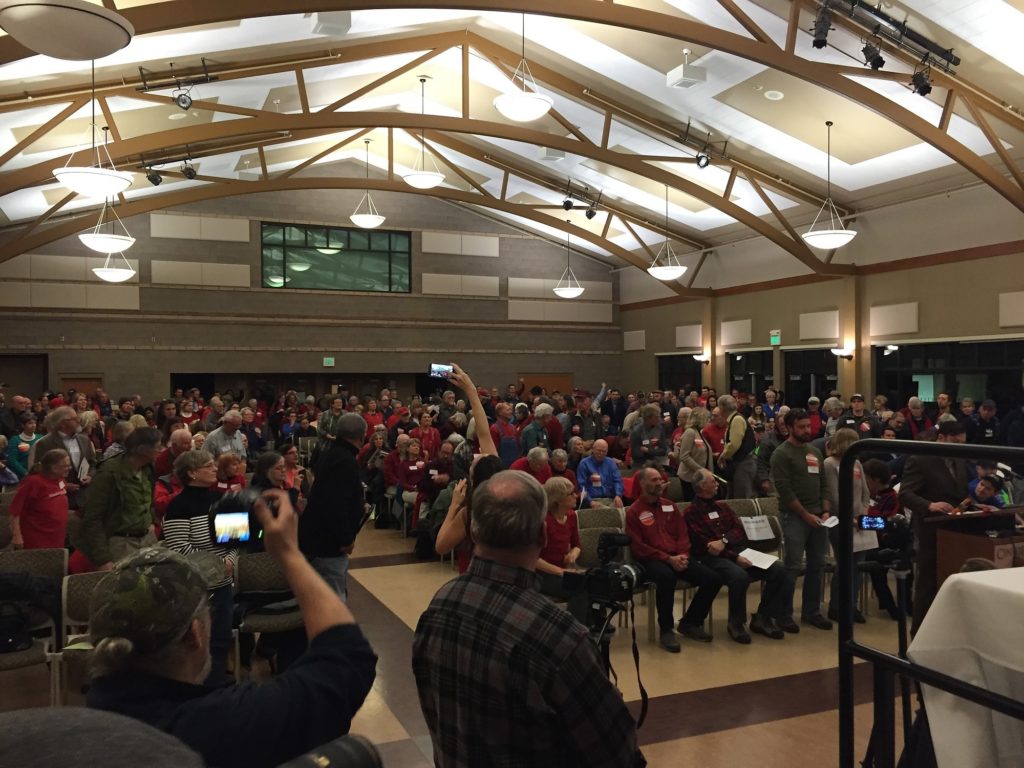
Close to 500 concerned citizens packed a public events center in Spokane Valley, Washington on Thursday evening taking part in a public hearing process for a proposed crude oil shipping terminal on the west coast. Over 100 citizens spoke up for the environment, public safety, and the future of our planet and all of those who inhabit it. They strongly opposed the proposal and completely dominated the public testimony by roughly ten to one. The predominant rallying cry during the majority of the individual 2-minute testimonies was, “keep it in the ground”.
The proposed Tesoro-Savage crude oil shipping terminal on the banks of the Columbia River in Vancouver, Washington, if approved as proposed, would handle an estimated 360,000 barrels of oil per day, which would make it the largest oil terminal on the West Coast. It would have roughly half the capacity of the somewhat recently denied Keystone XL pipeline; thus a massive pipeline on wheels.
Oil shipped in marine tankers from the facility to other ports around the Pacific would arrive to Vancouver via mile-long rail tanker cars. The highly explosive oil would make the 1,000 mile plus journey in unsafe tank cars from the Bakken oil fields of North Dakota. It would result in four new trains daily. All traveling on unsafe rail bridges over waterways and through multiple communities to supply the proposed volume. These bomb trains would pass through Montana, Idaho, Washington and Oregon, directly through many heavily populated communities, and would pass over and around many extremely sensitive and important water resources like the Clark Fork River in Montana, the Couer d’Alene River and Couer d’Alene Lake in Idaho, Lake Pend Orielle in Idaho, the Spokane River in Washington and the Columbia River in Washington and Oregon.
At the last minute on Wednesday afternoon I decided to join a van pool of activists from a number of towns in Montana. We were so concerned about the risk to to our waterways and our communities we were determined to make it the there and back. So we drove hours to the hearing in Spokane to make sure the concerns of Montanans were represented. I joined the caravan in my new’ish home base of Missoula, along with about ten others. We joined up with those who had already been traveling from Billings, Bozeman and Helena. We also stopped along the way to Spokane (my former city of 15 years) in Superior and St. Regis to gather others.
Getting the evening started in Spokane on Thursday evening was a short rally in front of the event facility featuring short speeches from local tribal leaders, a business leader and the mayor of Sandpoint, Idaho. Signs supporting “standing up to oil”, “keep it in the ground” and “protect our river or lake” were very present as was a light projection operation with varying messages displayed on the side of the building.
Fighting this crude oil shipping terminal and other proposed coal and oil projects was commonplace in the four years I served as Spokane Riverkeeper in Spokane. I was thrilled for the opportunity to return to Spokane to see everyone I worked on these issues with there, and to join members of my new community in representing concerns from the outer reaches of those who are in the crosshairs of this dirty fossil fuel project.
For Montanans (and Idahoans and everyone outside of the actual proposed site in Vancouver), the effects from approving the terminal would be felt all along the rail lines, and the fears of a disaster would be subjected upon all those en route. This is why traveling to Spokane for the third and final of the public hearing processes in front of the Washington State Energy Facility Site Evaluation Council (EFSEC) was an opportunity many activists and environmental organizations felt they had to take.
Co-leading the fight and the organizing at the hearing and the pre-hearing public rally that drew several hundred enthusiastic advocates and activists were Columbia Riverkeeper, Spokane Riverkeeper and Lake Pend Oreille Waterkeeper, who collectively have several thousand square miles of watershed and many hundreds of thousands of community members at risk if this massive project were to be permitted.
Even by chance a disaster on the tracks is avoided, which, given the unfortunate reality of the last few years we know is completely unlikely, the proposed terminal still presents a tremendous risk for the Columbia River and the surrounding community of Vancouver.
Our climate is at a tipping point. To avoid catastrophic warming, scientists estimate that approximately 80% of proven fossil fuel resources need to stay in the ground. Waterkeeper Alliance believes the last thing we should be doing is locking ourselves into decades more fossil fuel pollution by going forward with the Tesoro Savage terminal. This is the time when we need to be rapidly transitioning to clean energy because it won’t expose our communities to the risk of bomb train explosions, oil spills, water pollution and health impacts. Our country is at an important crossroads. I was proud to join hundreds of people last night who are leading the way by making strong call for a healthy future.
The hearing itself was a nearly five-hour affair with over 100 speakers giving official public testimony to EFSEC. EFSEC will ultimately make a recommendation to Washington Governor Jay Inslee, who will have the final say on this proposal. It wasn’t until after nearly 30 testified in] the hearing that the first “pro proposal” words were spoken. Up to that point local state and city elected official spoke out against the proposal and what it would mean to public safety and the environment, emergency response officials spoke out about their relative unpreparedness if a disaster occurred, tribal leaders spoke up for their native lands and the destruction this would cause, business leaders spoke out against this for what it would do to local development and also how shortsighted investing in fossil fuels is, and citizens from all walks of life spoke about global and local climate change impacts, impacts to human health, environmental health and impacts to non humans and a 10-year-old girl point blank asked the committee, “I thought we were supposed to be doing something about climate change; why are we talking about shipping oil”.
It was evident from the testimony given that momentum from President Obama’s recent and last State of the Union Address had carried over. There was an aura of confidence in those testifying, but more than that I never once felt that opponents had to spend time convincing anyone that climate change is real and that we must act to address it, or that dirty fossil fuel projects make sense in any way, shape or form in this day and age. Also, given the litany of dirty fossil fuel projects proposed on the coasts of Washington and Oregon over the last few years, and the momentum and progress of fighting those, citizens of the Northwest, Intermountain West and Great Plains have a right to feel confident.
On the van ride over from Missoula to Spokane, as we drove along the Clark Fork River, covered in ice and snow, I thought about the first time I heard about proposals to ship coal and oil through this region to be exported to China and India. At that time, roughly 2009, it felt that it would ultimately be inevitable, like a lot of environmental destructors. I compared that to my memory of how far we’ve come in fighting this and how successful we’ve been, and how perceptive and supportive the public is to this fight. And how the fact President Obama speaks so freely about climate change and how to fight what is causing it and how that didn’t seem imaginable in 2009. This position, a defiant position to fight back against fossil fuel projects and protect our planet is no longer about hope, but about reality.
One of the older activists in the van I was in said as we got close to Spokane, “I started getting involved in environmental advocacy and activism not because I thought we’d win, but because I wanted to go down swinging. Now I think winning is possible.”

